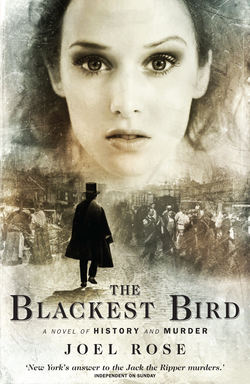Читать книгу The Blackest Bird - Joel Rose - Страница 9
На сайте Литреса книга снята с продажи.
Оглавление3
Murder
Two days passed as usual for one in the position of high constable.
With stultifying summer heat stifling the metropolis, crime boiled out of the dank Five Points, bubbled from the polluted colored enclaves along Minetta Creek, spewed along the moist docks of the fetid and unwholesome waterfront.
On Rose Street a sallow-faced barrowman was murdered by a cutthroat for his wheeled cart, four puncheons of rhum disappeared off the wharf at James Slip, three autumn morts were discovered strolling uneasily east on the Fourteenth Street, fully swathed beneath their dresses in bolts of watered silk, pilfered not five minutes before from the Endicott dry goods emporium. A young doctor from the City Hospital, accused by a medical colleague of buying the bodies of a diseased mother and child out of the bowels of that rank harborer of human distress, the Old Brewery, was found dissecting his victims’ corpses in a basement operating theater on Hester Street. Three toughs affiliated with the Charlton Street gang, out for a night of pirating, drowned in the Hudson River (here called, as it often was, the North River) when their stolen dory was struck and capsized by an oceanbound three-masted bark.
SO FOR OLD HAYS went the inimitable current of the city, the daily and nightly course of the constabulary, leading him to that Thursday morning, some minutes before ten, when a nervous young man in a plexus of high agitation, giving his name as Daniel Payne, his profession corkcutter, appeared at the Tombs’ gate and asked for High Constable Jacob Hays.
“I am the fiancé of Mary Cecilia Rogers,” the sallow-faced cull, escorted in by Sergeant McArdel, announced to Hays in a voice thin and much tinged by anxiety.
Until that moment the high constable had barely given second thought to Mary Rogers and her newest disappearance, having judged the girl to be enjoying another assignation with another beau.
As soon as the corkcutter introduced himself, however, Hays knew he had been mistaken.
“I am informed my rival, Mr. Arthur Crommelin, has visited here yesterday to inform you of certain circumstances surrounding my intended, and probably to implicate me,” Payne continued. “No matter. She has been found.” He did not look at Hays, but at the floor. A tremor passed through his body, and his words caught in his throat. “I fear she is d-dead,” he stammered.
A cold hand crept up from the high constable’s bowels to seize his intestines. “Dead?” he demanded. “How so, sir?”
“Mr. Crommelin is a onetime lodger at the Rogerses’ rooming house, where I myself am a lodger. Before my arrival, he was Miss Rogers’ intended, although I have now supplanted him. Yesterday, after coming here, Mr. Crommelin took it upon himself to launch a search for her. He went to Hoboken after having received news in a grog shop on Dey Street of a young woman fitting Mary’s description having been seen on the ferry. Once in New Jersey, he stumbled on a crowd surrounding a body by the riverbank near the Sybil Cave, and it proved to be she for whom he was looking.”
He began to sob her name, “Mary.”
“She had drowned?” Hays asked, studying the man as he choked and murmured.
“Something more, I fear.”
“More?”
“Mr. Crommelin attests she has been murdered.”
Old Hays looked upon the corkcutter intently. “And Mr. Crommelin is quite sure he is not mistaken, that Miss Rogers was not merely the victim of a terrible accident, a tragic drowning?”
“No, no,” Payne said almost indignantly. “Crommelin said murder. He admitted the water had taken a terrible toll on her face and body, and at first, he said, he had not been confident it was even her, but now he is sure. He returned at first light this morning, delayed, he said, due to his late testimony in front of the coroner’s inquest. He carried with him several bits of ribbon, a swatch of fabric cut from Mary’s dress, flowers plucked from her hat, a garter, and the bottom hem from her pantalette—all given him, he said, by the coroner, Dr. Cook, in order to show to Mrs. Rogers in hope of ascertaining positive identification of her daughter. Additionally, he said he took it upon himself to take a lock of Mary’s hair and one of her shoes, which he thought telling because of her unusually small feet.
“All have been identified by Mrs. R. as Mary’s.” Payne began again to sob. “It is undoubtedly her, sir.”
